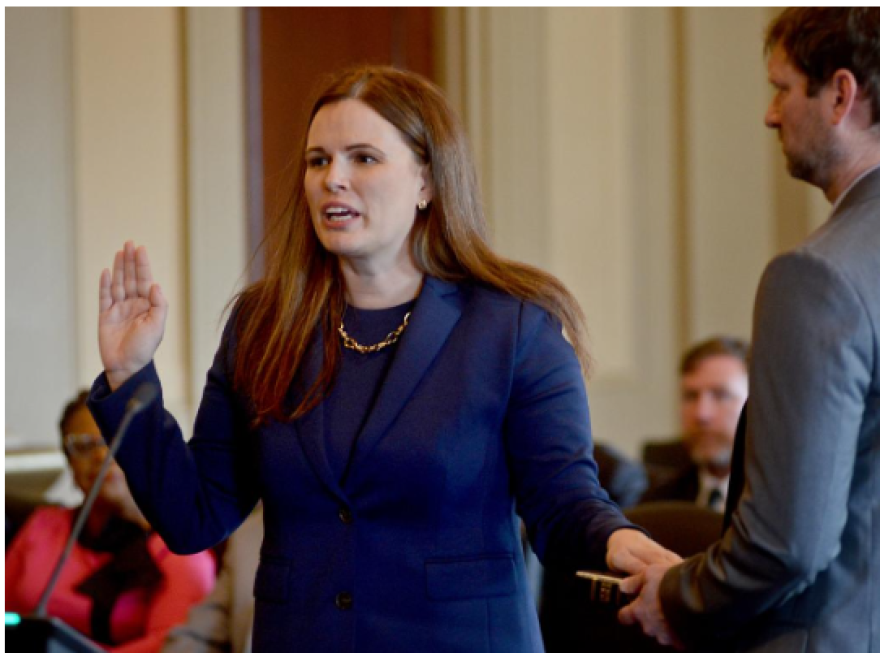This story first appeared in WFAE reporter Steve Harrison's weekly newsletter. Sign up here to get the news first in your inbox.
Last year, Democrats often complained the judicial system had become increasingly political, especially after the conservative U.S. Supreme Court overturned Roe v. Wade.
But this spring, those concerns abated, temporarily at least.
In a race for a key seat on the Wisconsin Supreme Court, a Democratic-backed candidate, Janet Protasiewicz, easily won after enthusiastically championing abortion rights.
In that race, leaning into politics worked.
Leading up to the election, Wisconsin Public Radio said: “Abortion rights supporters see (the election) as an opportunity to overturn Wisconsin’s ban on abortion” and added that the race was “shattering records for campaign spending and attracting national attention.”
Afterward, The Washington Post noted "the candidate and the Democrats supporting her focused relentlessly on abortion rights in a state that saw the availability of abortion disappear after the U.S. Supreme Court’s decision in Dobbs v. Jackson Women’s Health Organization.”
In North Carolina, Democratic state Supreme Court Justice Allison Riggs — who was appointed to the court by Gov. Roy Cooper last month — is running to keep her seat.
She has watched Wisconsin closely.
“There are lessons to be learned,” said Riggs, whose likely opponent in 2024 is Appeals Court Judge Jefferson Griffin, a Republican. “We should take those and apply them here in North Carolina.”
The state’s Code of Judicial Conduct limits what Riggs can and can’t say about issues , but she plans to run a very different campaign than how Democrats have traditionally run for the state’s highest court.
“I am not shying away,” Riggs said. “I intend to be a different kind of communicator. Whether that comes from being a litigator, or being used to talking to voters. I can get up and give a stump speech and be persuasive.”
Said Michael Bitzer, the politics department chair at Catawba College: “This will be the dawn of a new type of judicial race in the state. The days of a Sam Ervin running as a moderate Democrat are over.”
(Democrats Ervin and Lucy Inman lost their seats on the court last year.)
A background as litigator
The General Assembly made statewide judicial races partisan, starting with the 2018 election.
That year was good for Democrats. They expanded their majority on the state Supreme Court to 6-1 and won three seats on the Court of Appeals.
But Republicans started clawing back, narrowing the Democratic advantage to 4-3 after the 2020 election. They won two seats last year, giving them a 5-2 advantage.
Riggs does not have much experience on the bench.
She was an attorney for the Southern Coalition for Social Justice in Durham, and argued before the U.S. Supreme Court in a North Carolina redistricting case — Rucho v. Common Cause — that challenged partisan gerrymandering.
Cooper appointed her to the North Carolina Court of Appeals in February, and then to the state Supreme Court to fill Michael Morgan’s term. Morgan is running for governor.
With almost all of her legal experience as a litigator, Riggs is more pugnacious than a typical judge.
She is now trying to walk a fine line between campaigning on Democratic Party values without talking about how she would rule on a hypothetical case.
Like a six-week abortion ban.
“People ask me and I can’t answer, and I won’t answer how I would vote on a six-week ban,” she said.
But then she shifts gears.
“I can say that mine is a unique voice,” Riggs said. “I am the only woman of childbearing age on any of the appellate courts and diverse courts that reflect the living experience of all North Carolinians are good courts.”
She added: “I won’t answer a question about how I will vote, but I won’t shy away from talking about how my background, and my lived experience, and how my age and my gender are relevant when you want courts to fairly conduct a constitutional analysis.”
Wisconsin and North Carolina are different
But can North Carolina Democrats repeat the success of Wisconsin?
While both states are purple, Wisconsin definitely leans blue while North Carolina leans red.
Wisconsin has voted for a Republican for president once since 1984 (Donald Trump in 2016) while North Carolina has voted for a Republican for president in every single election since 1976 except once (Barack Obama in 2008).
It’s also important to note that in Wisconsin a total abortion ban could have gone into effect, while North Carolina Republicans took a more middle ground by banning most abortions after 12 weeks. A recent Meredith College poll found North Carolinians support the ban by a margin of 47% to 45%.
“What I can tell you is that on the campaign trail (abortion) seems to be at the front of minds,” Riggs said.



